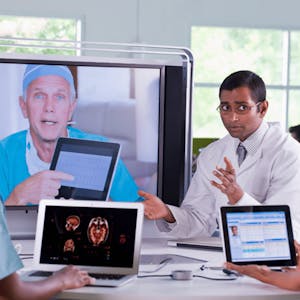Telehealth Best Practices and Uses is a comprehensive course offered by the University of California, Davis, focusing on leveraging technology tools for remote healthcare communication and services. This course is designed for healthcare professionals and organizations interested in practicing or integrating telehealth into their services.
The course delves into the real-world application of telehealth, providing insights on deployment, regulatory compliance, and ensuring a health equity lens. Through a series of modules, participants will examine best practices, understand health equity, and explore the elements of successful telehealth implementation.
Certificate Available ✔
Get Started / More Info
This course consists of four modules designed to provide in-depth knowledge and skills for implementing effective telehealth practices. Participants will explore topics such as technology tools, health equity, best practices, and elements of success in telehealth.
Module 1, "Getting Started and Telehealth: Operations," provides insights into the foundational aspects of telehealth, including technology tools, clinical applications, and understanding the return on investment. Participants will also gain an understanding of UC Davis Health's approach to telehealth and engage in reflective learning activities.
Module 2, "Telehealth: Equity," delves into the critical aspect of health equity in telehealth. Participants will explore the challenges and opportunities in addressing health disparities, and the promise of telehealth in promoting equity. The module includes quizzes and reflective exercises to reinforce learning.
Module 3, "Telehealth: Best Practices," focuses on institutional culture, effective participant preparation, and delivering bad news in a telehealth setting. This module equips participants with the knowledge and skills to practice telehealth with a patient-centered approach and emphasizes best practices in telehealth delivery.
Module 4, "Telehealth: Elements of Success," provides insights into managing telehealth programs, understanding licensure and credentialing requirements, and navigating federal and state regulations. The course culminates with a summary of key learnings and self-reflection activities to reinforce participants' understanding of successful telehealth implementation.
Epidemiology for Public Health equips learners with skills to interpret epidemiological research, consider its limitations, and design their own studies.
Breastfeeding: Public Health Perspectives offers a comprehensive exploration of breastfeeding's impact on public health, incorporating the Socio-Ecological Model....
Fundamentals for Implementing a Hypertension Program equips learners with essential knowledge and skills for managing hypertension programs in diverse healthcare...
Life Cycle Assessment is an in-depth course covering the methodology and practical application of assessing environmental impacts across the life cycle of products...